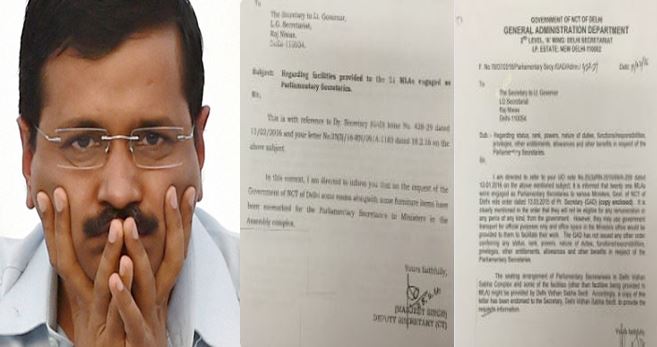If the Aam Aadmi Party in general and Delhi CM Arvind Kejriwal in particular excel at diverting the attention of the public from issues of immense significance to petty issues. One such recent issue which had exposed the Aam Aadmi Party was the appointment of 21 of its MLAs as Parliamentary Secretaries. This was something entirely against certain Constitutional provisions and thus the tall claims of honesty and integrity made by the AAP have fallen flat on its face.
AAP tried to cloth this attempt of going against the Constitutional spirit with legitimacy by passing a bill excluding the post of Parliamentary Secretary from the Office of profit. As soon as the bill was rejected by the President of India, Kejriwal was quick to shift the blame instantly upon the PM Narendra Modi.
As of now the issue has almost lost public attention, the petitioner in the case Advocate Prashant Patel explaining how the Parliamentary Secretaries are holding an ‘office of profit’ given that an office and furniture has been earmarked for them by the Government of National Capital territory of Delhi as is evident from the letter sent by the Deputy Secretary, Government of National Capital territory of Delhi to the Lt. Governor of Delhi, Najeeb Jung.
https://twitter.com/ippatel/status/753940436163653632
Here we explain how the appointment of 21 AAP MLAs as Parliamentary Secretaries was in grave violation of Constitutional provisions and how the defense given by Kejriwal is a mere diversionary tactic.
Violation of Article 191 and Article 239AA of the Constitution of India:
Article 191 of the Constitution of India mandates against holding of an office of profit by an MLA though the ‘office of profit’ is not defined in the Constitution or any statute. The definition and test of determining whether an office is an office of profit has been developed by judicial precedents.
Five tests have been laid down:
(i) whether the government makes the appointment;
(ii) whether the government has the right to remove or dismiss the holder;
(iii) whether the government pays remuneration;
(iv)what the functions of the holder are; and
(v) does the government exercise any control over the performance of these functions.
But the Supreme Court has held that the above said tests do not need to necessarily co exist and for determining whether an office is an office of profit under the government. Hence, the fact that no remuneration is being provided to Parliamentary Secretaries may not be a sufficient argument to exempt the post from being considered an ‘office of profit’.
Moreover, Article 164 (1A) provides that the number of ministers in a State Government cannot be more than 15% of the Members of the Legislative Assembly and Article 239AA further limits the same to 10% in case of Delhi. Therefore, the highest number of Ministers who can be appointed in case of Delhi is 7. Since, the secretaries often hold the rank of a Minister of State they have to be included in the total number of Ministers. Such appointments have been quashed by the judiciary in a catena of judgments. It is pertinent to mention here that the Bombay High Court has quashed similar appointment of two Parliamentary Secretaries in Goa in 2009 and the Calcutta High Court also quashed the appointment of 24 Parliamentary Secretaries in Bengal in 2015.
Kejriwal’s defence and the significance of this expose:
Kejriwal had given a monotonous and rhetorical response when this controversy had sparked up claiming that since no remuneration was paid to the Secretaries and other States too had made such appointments the appointments made by his Government were not bad in law. Thus, deliberately ignoring the limitation upon the number of MLAs who can be appointed as Ministers and the aforementioned judicial trend.
As far as the case for ‘Office of Profit’ is concerned, the letter made public by the petitioner holds immense significance as it clearly exposes that the Secretaries were provided certain facilities similar to those of a Minister including Office Space, transport facilities expressly provided for by the Government and special seating arrangements in the Legislative Assembly (over and above those provided to an ordinary MLA) by the Vidhan Sabha Secretary. These ‘special’ facilities provided by the State Government itself go on to prove how the Secretaries fulfill the criterion of an ‘office of profit’ thus exposing another public lie by the Aam Aadmi Party.
